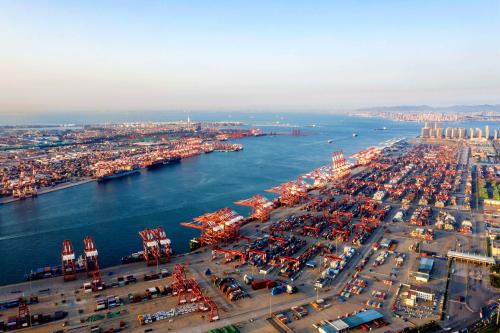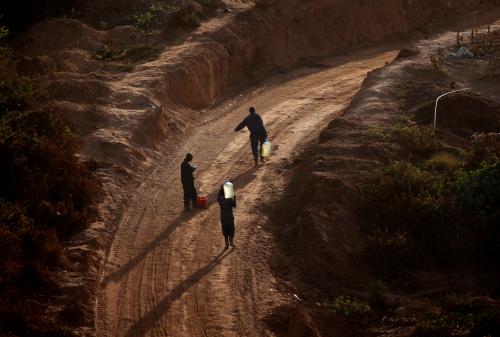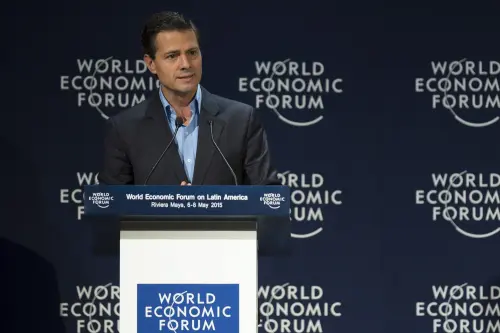Yesterday, IMF Managing Director Christine Lagarde came to Brookings to talk about the Fund’s role in financing for development—a preview of issues she will raise at the Addis Ababa Financing for Development conference next week on this same topic. Participants there will discuss how to best implement the Sustainable Development Goals that will be adopted at the U.N. General Assembly this September. Lagarde’s talk was followed by a panel discussion in which I participated.
To forestall questions about Greece, Ms. Lagarde made three quick points in her introduction: (1) The IMF is involved in Greece because they were invited there; (2) Where the IMF is involved it has to follow its rules and be evenhanded—“there cannot be any special treatment”; and (3) IMF loans have always been conditional upon requirements aimed at “restoring stability, restoring growth, and debt sustainability.” For Greece, said Lagarde, the “analysis has not changed.”
Financing for development
Turned to the topic of the day, Ms Lagarde structured her talk around three themes.
The global development landscape is changing. There has been significant progress in the past 15 years, with growth, trade, and capital flows all expanding rapidly, and developing countries becoming far more integrated into this global economy. Yet paired with this progress, we have unfortunately seen a big variance across and within countries. Lagarde noted, “Better performing economies—often underpinned by robust domestic policies—have forged ahead. Sadly, the poorest and most fragile have been left behind.” Indeed, despite overall global progress, developing countries and fragile states—often agriculturally reliant—remain most susceptible to recent shocks, including the 2008 financial crisis, climate change, and demographic shifts.
Domestic policies are important for sustainable growth. Lagarde also emphasized the critical importance of domestic policy, echoing her earlier remarks on Greece. The cornerstone of long-term growth, of course, remains sound macroeconomic policy and stability. But IMF research shows that “growth that is more inclusive is also higher and more durable. To put it another way: fairness is good economics as well.” Thus, when the IMF considers its interests in monitoring stability, it finds that relevant policies are not just macroeconomic, but also concern inequality and gender.
Collective action is important. Lagarde compellingly pointed out why the international community is bound together in this effort, touching on the interconnected challenges of tax evasion, multilateral trade, and even terrorism. Such interconnected challenges demand global responses, and the IMF made some specific commitments:
- It will allocate more technical assistance resources—already at 20 percent—to building capacity in countries to mobilize domestic revenues and to use those revenues effectively to “tackle poverty and drive sustainable growth.” Two specific examples included bringing developing countries into international taxation debates, and working harder to eliminate untargeted subsidies such as those put toward energy (which help the wealthy and hurt the environment).
- It will review the efficiency and effectiveness of public investments to ascertain where these have had a high returns.
- It will strengthen engagement on issues of inclusive growth, climate change, gender, and jobs, and apply findings in operational work, including through their inclusion in Article IV discussions with country authorities.
Discussion needed in Addis Ababa
After Lagarde’s remarks, the panel discussion moved around a few themes in building on and questioning the IMF’s role in financing for development over the next 15 years. Could tax avoidance issues be tackled without strong buy-in from the corporate sector? Has the IMF done all it can to eradicate fuel subsidies in rich countries, and can poor countries make a difference on their own? And how easily can blended finance models conquer the massive need for infrastructure projects around the world?
The managing director took these questions head on. She reiterated the need for partnership, including the private sector, in addressing tax avoidance as well as other issues, and expressed hope that a “corporate conscience” could indeed lead to optimized tax positions, with some countries already providing voluntary data.
Lagarde also noted the IMF would use the Article IV instrument to address some of the structural issues beyond traditional macroeconomics. For example, she mentioned the focus of the United States’ Article IV discussion on financial market stability. She expressed hope that energy subsidies would also feature in upcoming Article IV discussions.
And on financing infrastructure, through debt and otherwise, Lagarde and I shared some optimism. It can be difficult to differentiate the many pools of capital and blend them in a way that works for big, long-term infrastructure investments. But it is heartening that the IMF is not shying away from public, debt financed projects, and instead is focusing on fine-grain analysis of projects that work and are inclusive and low-carbon, and weeding out those that have a lower return to inclusive growth.
In the past few days, the IMF has already taken concrete steps to expand concessional facilities by 50 percent, target resources more on the poorest countries, and maintain a zero percent interest rate over the longer term for loans to fragile and disaster-stricken countries. “The IMF intends to create a more supportive environment for developing countries to prosper in the period ahead,” said Lagarde. “We will play our part.”
See the event this blog discusses
here
.



Commentary
How the IMF intends to support the prosperity of developing countries: Christine Lagarde discusses financing for development and Greece
July 9, 2015